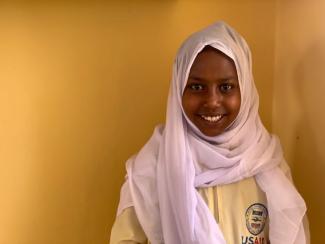Sudan’s remote Red Sea State has one of the country’s lowest basic education enrollment rates—46 percent—and a very low completion rate, 20.4 percent. Students in Red Sea State face numerous challenges reaching and staying in school.
Fatma, 13, was popular among her classmates and used to love going to school. Her favorite subject was science and she was among the top students in her class. When her family moved to a different house last summer, school became too far away for her to walk and her father could not afford to pay for transport. To her dismay, she could not continue attending school.
Amna, 12, wants to become a nurse. She and four younger siblings used to walk to school together. Reaching puberty brought a new struggle for Amna. With lack of sanitation and hygiene in her school, she would miss about four days of school each month because she preferred to stay home when she was menstruating. Eventually her grades declined so much that her father decided it wasn’t worth the trouble sending her to school.
To address these challenges and help boost school enrollment and retention in Red Sea State, USAID’s Toward Enduring Peace in Sudan activity is supporting five schools in Sinkat, a small town that lacks electricity, running water, sanitation and hygiene services, and transportation. By providing clean water, transportation, school uniforms, school bags, sports equipment, microphones and speakers, and training for teachers, enrollment and retention is increasing.
Now both Fatma and Amna and many other children have been able to return to school. Their dreams were temporarily disrupted but they’re now pursuing their goals through USAID assistance.
“The enrollment rate has now increased by 60 percent” compared to the year before, said Amna Ali, principal of Alengaz Primary School. “These girls study in a highly challenging environment, but education is probably the most important tool to change one’s life.”
With big, bright smiles, children eagerly lined up at Alengaz School to receive their new uniforms and school bags. “I can’t wait for the new year to start,” said Ahmed, as he patiently waited his turn.
As part of USAID’s support, teachers were trained on teaching methods and writing reports such as student assessments, which has enhanced their performance. Aisha Alnour, principal of Beir Nakso School said, “The number of new students is increasing steadily for the new year.”
When children and youth are prepared to go to school, learn, and gain the skills they need for life and work, they are able to build more hopeful and prosperous futures for themselves, their families, communities, and countries.

